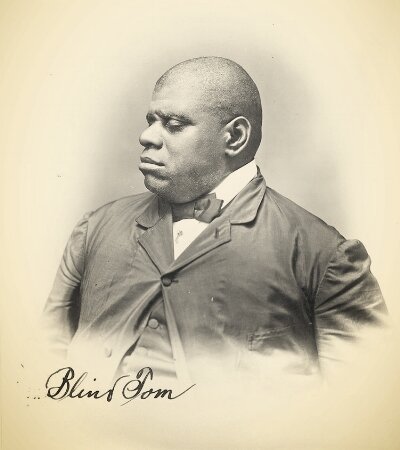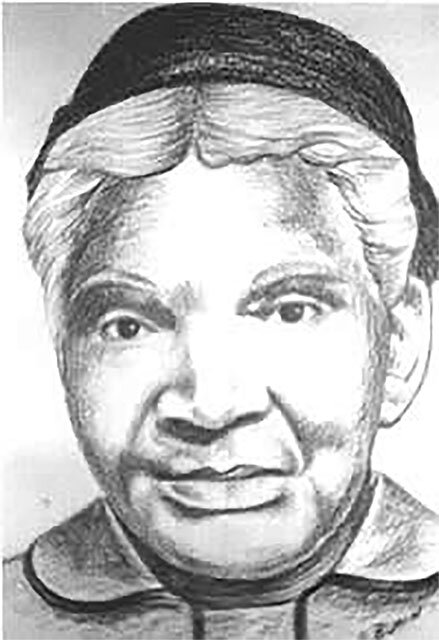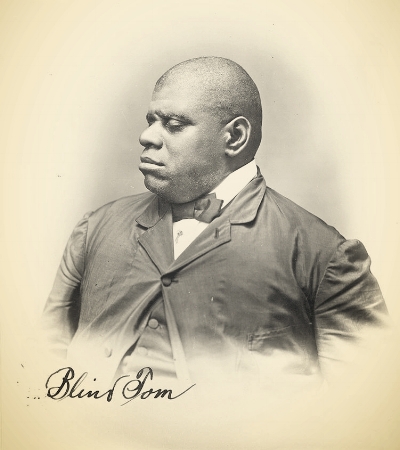Thomas Green Wiggins also is known as Thomas Wiggins or “Blind Tom,” became the highest-paid pianist of the 19th century and was one of the best-known American performing pianists. Thomas also made history by becoming the first black person to perform in the White House. His repertoire included Beethoven, Mendelssohn, Bach, Chopin, Verdi, Rossini, Donitzetti, Meyerbeer, and many others.
 I have researched many untold black stories, but this one, unlike any others, gets under my skin. As I write this blog, I am listening to Thomas’s composition entitled’ Battle of Manassas (1861). This is Tom’s most famous piece. He is reconstructing an eyewitness account of that Confederate battle complete with notes to imitate cannon shots, troop train whistles, and other battle sounds. I am trying to envision an autistic, blind, slave boy playing this during the era of racism and injustice in which he may have not even knew existed. I can not call this beautiful gift of a man, “Blind Tom,” I will call him Tom or Thomas the name his mother gave him.
I have researched many untold black stories, but this one, unlike any others, gets under my skin. As I write this blog, I am listening to Thomas’s composition entitled’ Battle of Manassas (1861). This is Tom’s most famous piece. He is reconstructing an eyewitness account of that Confederate battle complete with notes to imitate cannon shots, troop train whistles, and other battle sounds. I am trying to envision an autistic, blind, slave boy playing this during the era of racism and injustice in which he may have not even knew existed. I can not call this beautiful gift of a man, “Blind Tom,” I will call him Tom or Thomas the name his mother gave him.
Thomas Green Wiggins Early Life
Blind from birth and born into slavery on May 25, 1849, in Columbus, Georgia. Tom became well known for his piano virtuosity. When Thomas was born, his master, Wiley Jones, was unwilling to bear the costs of maintaining a ‘worthless runt’ as it was said and wanted him dead. When Thomas was nine months old, his master decided to put the blind infant, his two sisters, and his parents up for auction, individually. Thomas’ mother, Charity, approached a neighbor, General James Bethune, and begged him to save her family from the auction block. He rejected the offer, but the day of the action, The Wiggins family was sold to General James Neil Bethune. A lawyer from Georgia and an editor of a newspaper in which he openly advocated secession.
 Photo Credit: Mark Twain
Photo Credit: Mark Twain
Blindness
Although legally blind, Tom had some light perception. ‘When he was around three or four years of age, it was observed that he passed most of his time with his face upturned to the sun as if gazing intently upon it. He was occasionally passing his hand back and forth with a rapid motion before his eyes.’ ‘When five or six years of age, it was discovered that within a tiny space, he could see any bright object. They had hoped that in time, his sight would improve.
Autism
Tom had a sensitivity to sound. He could repeat others’ conversations. He deliberately would drag chairs around, bang pots together, and provoke his siblings to scream so he could hear the noises again and again. Though undiagnosed at the time, Tom demonstrated unusual behavior. A doctor declared him as non compos mentis, which translated from Latin means “not having control of one’s mind.” But as the knowledge of autism improved long after his death, it became clear that Tom was an autistic savant.

Early Career
The Bethune family had seven musically gifted children who played the piano or sang, and Wiggins stood by, rapt, as the children practiced. According to the family’s account, one day, when the Bethunes had company, one of the daughters entertained them by playing the piano. As she finished playing a rigorous selection, lunch was served. After the group sat down at the table, the strains that the Bethune daughter had finished a few minutes earlier came from the supposedly empty parlor. The group rushed in to find the little Tom, playing the piano, repeating the difficult piece he had just heard.
Tom learned how to memorize sounds very quickly. He would mimic the piano playing of Bethune’s daughters and repeated their music from memory. Piano lessons were provided for him by several Italian and German music teachers, and Tom’s ability quickly surpassed that of his teachers. With Beethoven-like precision, he learned to play a piece of music after hearing it just once. One of his teachers even said that Tom’ repulsed her’, but she taught him because of the pay ($5.00, a high salary for music teachers at the time).
Thomas Wiggins reportedly wrote his first composition, “The Rain Storm,” at the age of five based on experiencing a thunderstorm that day. When he was ten, he was given a grand piano by famous piano manufacturer, William Knabe, which had the inscription ‘a tribute to a genius’. At the age of eight, the boy whose stage name became, “Blind Tom”, was “loaned” to Perry Oliver, a concert promoter who toured with him throughout the U.S. Performing four times a day, Tom was earning up to $100,000 a year (equivalent to $1.5 million in 2004), more than any known pianist at the time. All of Tom’s earnings went to his owner and his promoter. He nor his family received not a dime. He was still a slave, and racism was very much alive. When Tom went on tour in the South with Bethune, many of his performances were canceled due to racist hostility.
In 1860, Tom became the first Black person to perform at the White House, in front of President James Buchanan. And later, President Abraham Lincoln in the Union’s service, and Mark Twain was one of his most frequent attendees.
[youtube=://www.youtube.com/watch?v=T6vLl-55szE&w=854&h=480]
Twain wrote about his impression of Thomas Wiggins by saying:
“Some archangel, cast out of upper Heaven like another Satan, inhabits this coarse casket; and he comforts himself and makes his prison beautiful with thoughts and dreams and memories of another time… It is not Blind Tom that does these wonderful things and plays this wonderful music–it is the other party.”
Legal problems
Tom’s parents had an arrangement made with Tom that Bethune would have custody of him until he turned 21 years old. This agreement would provide him with room and board and $20 a month, and the parents would receive $500 a year plus food and shelter. However, when Tom finally turned 21 years old, Bethune had Tom declared legally insane. He then appointed himself his legal guardian, effectively continuing the profitable relationship. They spent the next eight years on U.S. tours, including summers spent in New York.
John married Eliza Stutzbach in 1882, but after John left for eight months on tour, Eliza sued for divorce, claiming she had been deserted. Before the divorce was finalized, John died in a railway accident in 1884. Tom was returned to stay with General Bethune, who was then living in Virginia. Tom’s mother, Charity, stated, ‘They stole my boy away from me!’. She tried to appeal in court to be able to be with him longer and keep some of the money he earned.
 Before Bethune’s death, his will banned Eliza from any inheritance, calling her a “heartless adventuress who sought to absorb my estate.” The courts objected to her request. In 1865, slaves were “officially freed” however ‘newly freed slaves, but many remained slaves. Many black slaves or former slaves were made to ‘entertain” their owners by play music. Tom’s mother had been made to dance for her owners in this way.
Eliza married her attorney, Albrecht Lerche, and managed Tom’s career until his health began to fail in 1904. Tom died on June 14, 1908, at Eliza’s home in Hoboken, New Jersey, The headline in the New York Times read, “Blind Tom, Pianist, Dies of a Stroke – a Child All His Life.”
Released in 2000, A New York pianist John Davis has professionally recorded 14 of Blind Tom’s original compositions on a CD entitled John Davis Plays Blind Tom (Newport Classics NPD85660).
[youtube=://www.youtube.com/watch?v=aPkbvbzTbiQ&w=640&h=480]
Thomas Wiggins Key Points
-
Tom was a black, blind, autistic slave
-
became the first African-American to be invited to perform at the White House, in front of President James Buchanan
-
He could imitate any animal with incredible accuracy, and apparently, he could repeat conversations 10 minutes long.
-
When Tom went on tour in the South with Bethune, many of his performances were canceled due to racist hostility.
-
Tom was earning up to $100,000 a year (equivalent to $1.5 million in 2004), more than any known pianist at the time.
Work Cited
“Blind Tom,” born a slave, at the age of 10 became the …. https://www.thevintagenews.com/2018/01/05/blind-tom/
A 19th Century Marvelous Musician – Wisconsin Medical Society. https://www.wisconsinmedicalsociety.org/professional/savant-syndrome/profiles-and-videos/profiles/blind-tom-a-19th-century-marvelous-musician/
Musings: BILL P.’S LEGACY – macblogphd.blogspot.com. https://macblogphd.blogspot.com/2019/04/bill-ps-legacy.html
“Blind Tom,” born a slave, at the age of 10 became the …. https://www.thevintagenews.com/2018/01/05/blind-tom/
Blind Tom Wiggins: Black Neurodivergent Excellence | NOS …. https://nosmag.org/blind-tom-wiggins-black-neurodivergent-excellence/
The 19th Century’s Highest-Paid Piano Player Was A Blind Slave. https://allthatsinteresting.com/blind-tom-wiggins
A sad song from the past: Blind Tom | News | fauquier.com. https://www.fauquier.com/news/a-sad-song-from-the-past-blind-tom/article_85827a4a-ba1f-11e9-8fad-07464bd4bd6a.html


